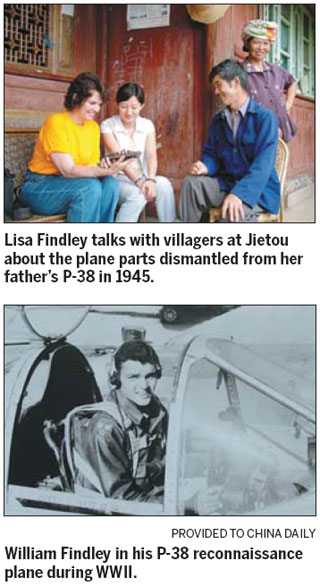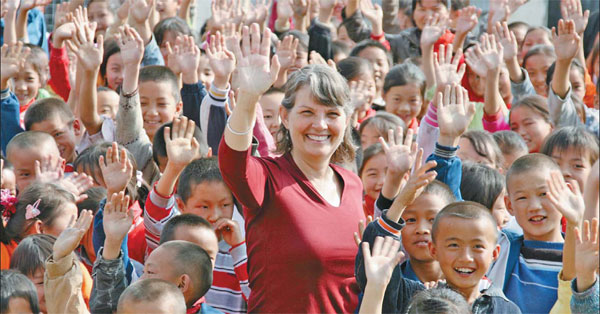Pieces of the past
Updated: 2013-08-20 07:50
By Li Yang (China Daily)
|
||||||||
|
Lisa Findley and the students at Jietou Central Primary School in Tengchong, Yunnan province. Photos by Gong Zujin / For China Daily |
My China Dream | Lisa Findley
Her father was a young American fighter pilot who crash-landed in a remote village in China. Now the daughter has revived the connection with villagers who saved her parent. Li Yang tells the story in Tengchong, Yunnan.
In July this year, Lisa Findley was in China again. The 59-year-old architectural professor from California came to Jietou in Tengchong with her students, her eighth visit to the small town in Southwest China's Yunnan province in 13 years, all in memory of her father's two-day encounter here in 1945.
William Findley was a young United States air force fighter pilot who had belly-landed his P-38 reconnaissance plane in a "rain-slick rice paddy" in Yongle village on Valentine's Day, 1945.
He was rescued and escorted back to his unit by local villagers. Later, villagers dismantled his plane after servicemen who came to inspect the crash site concluded that it was beyond repair.
The villagers recycled the parts.
 |
Among the items they made were the school gong, washbasins, rice noodle funnel boards, peelers and candlesticks. Some even took a rubber cover off the plane that had the English word "outside" painted on it and preserved it as a family heirloom, even though they did not understand what the word meant.
All these parts and pieces still being used in the villagers' kitchens, bathrooms, bedrooms, and school are like magnets to Lisa Findley, drawing her to visit again and again.
William Findley died in 1989 in his mid-70s, regretting he did not get a chance to return to Jietou. Now his daughter is making his wish come true many times over.
"I was able to meet with so many wonderful people there," Lisa Findley said during a visit in October 2002. "It was those wonderful people who guided my father out of the mountains to return to his unit, when he was feeling most helpless."
This became the keynote of her speech whenever she comes to "the corner of the other world" where her father had stayed for two days - 48 hours which changed his outlook on life.
"He had thought himself far away from war and death while flying a reconnaissance aircraft so high up in the sky," Findley says.
To the helpless and desperate young man, the villagers' hospitality and sympathy made him realize how insignificant and meaningless technology and training were when he was faced with danger.
He knew then that the most important things in life were human benevolence and reverence for each another, and that it went beyond the differences in language, culture, belief, religion and politics.
"Without the goodwill, we will always feel helpless and our life will be a mess," Findley quotes her father's words in a speech to students at a primary school in Jietou, explaining why Jietou was so important for her father, who later became a teacher and a missionary after the war.
For the Findleys, Jietou had become a second home, especially for Lisa, who is now writing a book dedicated to her father.
That is the reason she returns often, staying at the same motel. The folks recognize her and greet her warmly as if she were a part of the local neighborhood.
Huang Minghui, 55, a villager in Jietou, has a special connection with Findley - his father was the one who saved William, and the rubber cover with the word "outside" and William's photo still take pride of place in his home.
Lisa has visited Huang's house many times.
"She is regarded as part of us in Jietou", says Gong Zujin, a local reporter who has followed her story for years.
"She is affable and sincere and we get along very well with her." Sometimes even better than with each other, Gong adds.
"My stay in Jietou solved a puzzle as to why my father was so changed after such a brief stay here," Findley says. "I, too, can feel the people's hospitality and kindness, and it has not changed as time goes by."
Findley did not come just to say thank you.
She has contributed to the community, giving the local government 30,000 yuan ($4,770) to rebuild a playground after seeing children standing in the mud in their bare feet.
Since 2005, she also donated $1,000 every year to the town's central primary school, and bought pianos, books, speakers and computers for other schools. In addition, she has sponsored three students to college after learning of their financial difficulties.
The gong made from a part of her father's plane now hangs at the town's central primary school, and she says, "That's the P-38's best legacy."

As an architect, Findley also consults with the county government, submitting valuable suggestions on renovating and refurbishing projects in the county and the construction of a new museum about the War of Resistance against Japanese Aggression.
Zhang Zijun, a local female farmer in her 70s, says: "We see Lisa as our family member. The feeling is strange. I was at the rice paddy when the villagers saved her father 68 years ago. I clearly remember every detail of that rescue."
William Findley had given the young Zhang a piece of chocolate, something she had never seen or tasted before.
"It was the best sweet I ever had," Zhang recalls with a smile. "His daughter Lisa gave me a bar of chocolate again when she heard my story, and tasting it again brought tears to my eyes."
Contact the writers through liyang@chinadaily.com.cn.
Li Yingqin and Gong Zujin contributed to the story.

 'Despicable' minions upset Depp's 'Lone Ranger' at box office
'Despicable' minions upset Depp's 'Lone Ranger' at box office
 'Taken 2' grabs movie box office crown
'Taken 2' grabs movie box office crown
 Rihanna's 'Diamonds' tops UK pop chart
Rihanna's 'Diamonds' tops UK pop chart
 Fans get look at vintage Rolling Stones
Fans get look at vintage Rolling Stones
 Celebrities attend Power of Women event
Celebrities attend Power of Women event
 Ang Lee breaks 'every rule' to make unlikely new Life of Pi film
Ang Lee breaks 'every rule' to make unlikely new Life of Pi film
 Rihanna almost thrown out of nightclub
Rihanna almost thrown out of nightclub
 'Dark Knight' wins weekend box office
'Dark Knight' wins weekend box office
Most Viewed
Editor's Picks

|

|

|

|

|

|
Today's Top News
Western program new engine for growth
China, Kenya agree to bolster ties
Online shopping clicking up
Typhoon wreaks havoc in the south
ROK-US drill starts as tensions ease with DPRK
Manners missing in overseas travel
Snowden reporter threaten UK
Egypt's Mubarak may be freed
US Weekly

|

|








